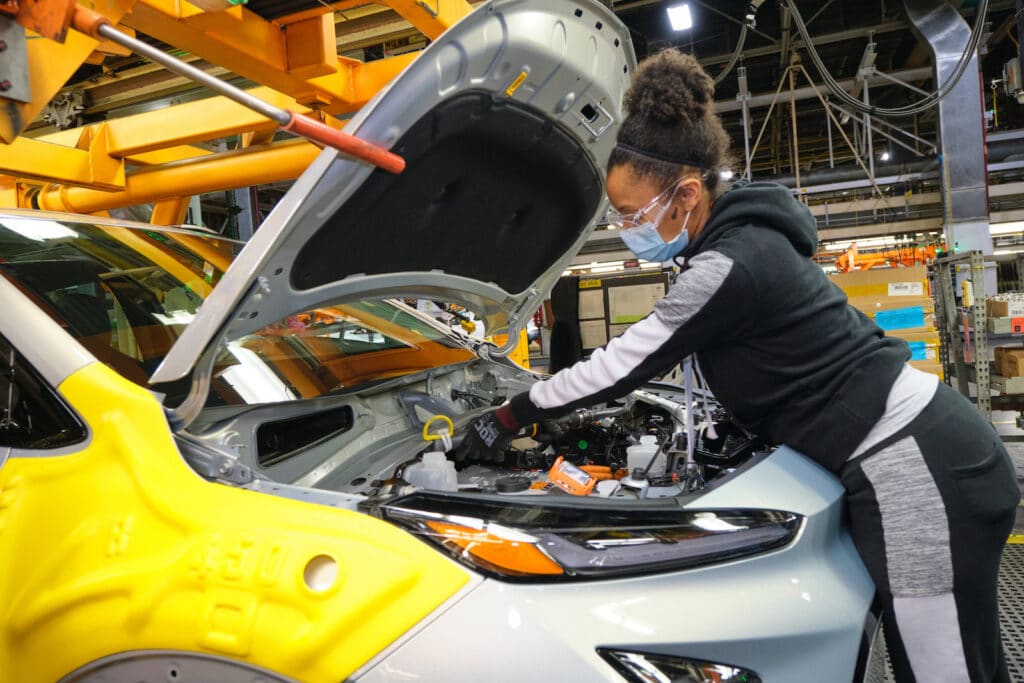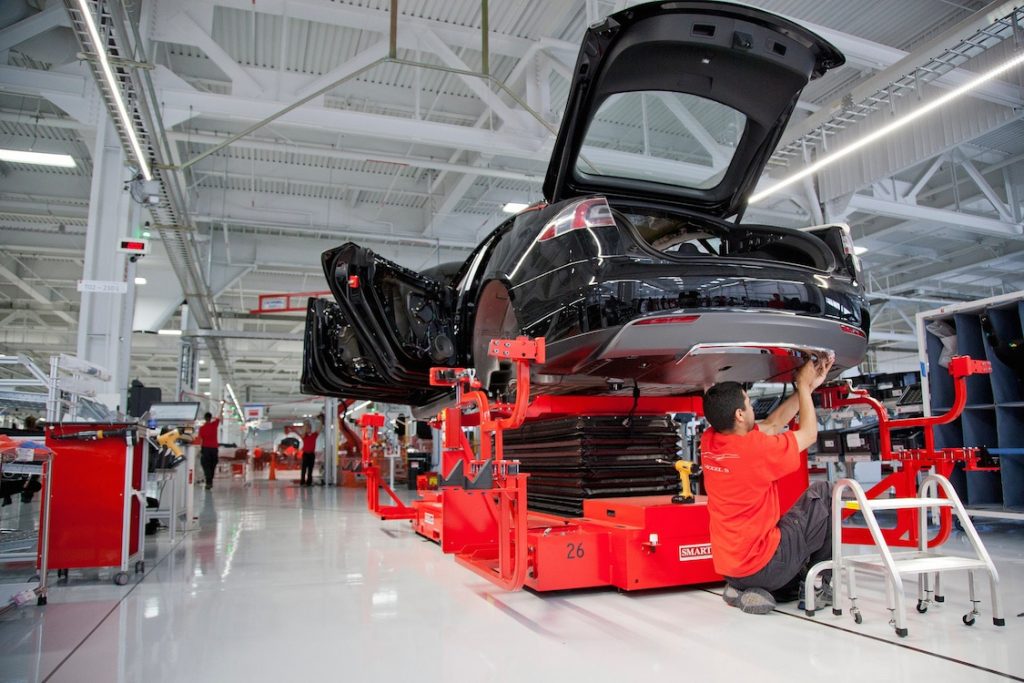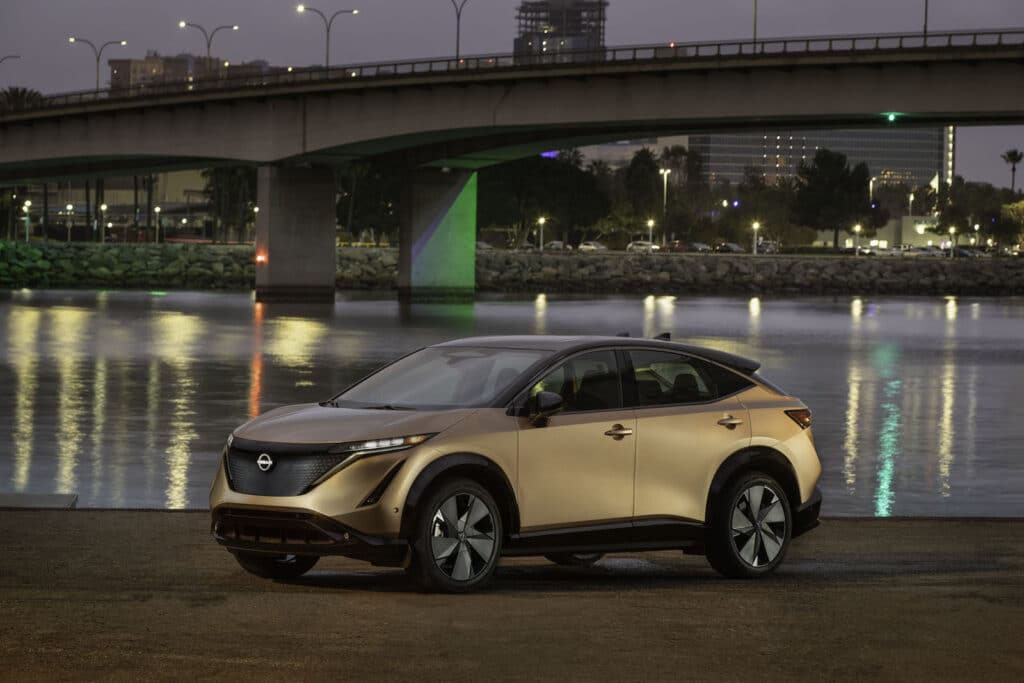Operations at the General Motors assembly plant in Orion Township, Michigan ground to a halt today and will remained idled until at least Aug. 30.

While GM is taking downtime at a number of plants, including the truck plants in Michigan, Tennessee and Mexico, the temporary closure in Orion Township is notable — and worrisome, according to industry observers. The factory produces GM’s two battery-electric vehicles, the Bolt EV and EUV. It’s the first time the facility has been shutdown since the semiconductor shortage began.
Virtually every automaker has been impacted by the chip crisis … and few models have escaped without production cuts. But analysts note battery-electric vehicles could be particularly vulnerable going forward. And the issue could not only cause shortages of existing products but also delay the launch of the many new models scheduled to come to market in the next 12 months.
That includes eagerly awaited battery-electric vehicles such as the GMC Hummer and Ford F-150 Lightning pickups, the Nissan Ariya SUV and the Lucid Air sedan, among others.
Computers on wheels
Today’s cars, trucks and crossovers are computers on wheels. The typical gas-powered model can use as many as 100 microprocessors — or more — to operate everything from their powertrain controls to their infotainment and digital safety systems. But, by their very nature, battery-electric vehicles need even more chips, according to Sam Abuelsamid, principal analyst for Guidehouse Insights.

With BEVs, that number can run into the hundreds, many of those chips required to monitor the health of the cells that make up a battery pack. Major chipmakers such as Cree, ADI and NXP were forecasting double-digit annual growth in demand for chips used in EVs in the decade ahead.
But automakers aren’t the only ones demanding more semiconductors. Since the COVID pandemic struck there has been a surge in sales of smartphones, videoconferencing gear, videogame devices and other digital devices.
Silicon chip suppliers were only too happy to provide consumer electronics manufacturers with what they needed because the auto industry slashed semiconductor orders when the pandemic struck. When the massive plunge in car sales didn’t last as long as predicted automakers tried to increase their orders, but they had to go to the back of the line and wait.
Software tricks

Tesla, the largest of the EV manufacturers, has been using software tricks to try to minimize the impact of the semiconductor shortage. It also cut back on production of its Powerwall battery backup system, diverting some of the chips they needed to its car plants in the U.S. and China. But the crisis has caught up with the company.
Several reports this past week indicate Tesla is pushing back delivery dates on a number of its automotive models, apparently due to chip shortages. The automaker — which no longer employs a public relations department — did not respond to a request for comment, but it did note delivery delays on its website.
“The chip shortage issue isn’t moderating to the extent that the Tesla bulls had hoped,” said Dan Ives, tech analyst with Wedbush Securities and one of the analysts with a bullish forecast on Tesla shares. He told CNN the delivery estimates have all been pushed back during the course of the last week.
The number of battery-electric vehicles now in production is relatively low, but has grown substantially during the last 12 months with the addition of BEVs like the Ford Mustang Mach-E and Volkswagen ID.4. That’s only expected to accelerate through the 2022 model year as vehicles such as the GMC Hummer pickup, Cadillac Lyriq, Lucid Air, Ford F-150 Lightning and other models are scheduled to come to market.
More new programs, more potential delays

But observers worry that such programs will come off as planned. Nissan in June announced that its second all-electric model, the Ariya SUV, would be delayed. It was supposed to reach showrooms right around now but will be launched no earlier than winter, according to the Japanese automaker.
Nissan has been especially hard hit by the chip shortage and has idled its massive assembly complex in Smyrna, Tennessee through the end of this month.
Ford has likely been hammered the most by the crisis, so far this year losing production of more than 350,000 vehicles, including over 100,000 of its conventionally powered F-Series pickups. When asked this week whether chip shortages could delay the launch of the F-150 Lightning, a senior Ford official said on background the automaker is proceeding as planned.
The electric pickup isn’t scheduled to reach showrooms until June 2022. By then, TheDetroitBureau.com was told, Ford hopes the chip shortage will be resolved. If not, several insiders said, the Lightning could face delays, like so many other vehicles set to debut in the coming year.
As for the Chevy Bolt EV and EUV models, this week’s plant closure may not be as bad a deal as it sounds. The automaker last week announced it was recalling every one of the two models built so far to address potential battery fires. It may use the downtime to address manufacturing glitches with the battery packs used by the two Bolt models.







